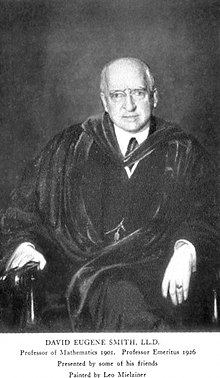David Eugene Smith
David Eugene Smith | |
|---|---|
 David Eugene Smith | |
| Born | January 21, 1860 |
| Died | July 29, 1944 (aged 84) New York City, New York |
| Citizenship | Vereinigte Staaten |
| Scientific career | |
| Fields | Mathematics |
David Eugene Smith (January 21, 1860 – July 29, 1944) was an American mathematician, educator, and editor.
Education and career
David Eugene Smith is considered one of the founders of the field of mathematics education. Smith was born in Cortland, New York, to Abram P. Smith, attorney and surrogate judge, and Mary Elizabeth Bronson, who taught her young son Latin and Greek.[1] He attended Syracuse University, graduating in 1881 (Ph. D., 1887; LL.D., 1905). He studied to be a lawyer concentrating in arts and humanities, but accepted an instructorship in mathematics at the Cortland Normal School in 1884 [2] where he attended as a young man.[3] While at the Cortland Normal School Smith became a member of the Young Men's Debating Club[4] (today the Delphic Fraternity.) He became a professor at the Michigan State Normal College in 1891 (later Eastern Michigan University), the principal at the State Normal School in Brockport, New York (1898), and a professor of mathematics at Teachers College, Columbia University (1901) where he remained until his retirement in 1926.
Smith became president of the Mathematical Association of America in 1920[2] and served as the president of the History of Science Society in 1927.[5] He also wrote a large number of publications of various types. He was editor of the Bulletin of the American Mathematical Society; contributed to other mathematical journals; published a series of textbooks; translated Felix Klein's Famous Problems of Geometry, Fink's History of Mathematics, and the Treviso Arithmetic. He edited[6] Augustus De Morgan's A Budget of Paradoxes (1915) and wrote many books on Mathematics which are listed below.
Works
- Plane and Solid Geometry (1895), with Wooster Woodruff Beman[7]
- History of Modern Mathematics (1896; 4th edition, 1906, reissued as a separate work) Cornell Historical Math Monographs
- The Teaching of Elementary Mathematics (1900) Cornell Historical Math Monographs
- Intermediate Arithmetic (1905) [1]
- The Teaching of Arithmetic (1909; revised edition, 1913)
- The Teaching of Geometry (1912)
- Rara Arithmetica (1908)[8]
- The Hindu-Arabic Numerals (1911), with Louis Charles Karpinski
- A Bibliography on the Teaching of Mathematics (1912), with Charles Goldziher
- A History of Japanese Mathematics (1914), with Yoshio Mikami
- Number Stories of Long Ago (1919)
- Elements of Projective Geometry (1922), with G. H. Ling & George Wentworth[9]
- Mathematics In series Our Debt to Greece and Rome. (1923) Michigan Historical Math Collection
- History of Mathematics: 2 Volumes (1923/5). Reprinted Dover, 1958.
- A History of Mathematics in America before 1900 (1934),[10] with Jekuthiel Ginsburg; Carus Mathematical Monographs
- Le comput manuel de Magister Anianus. (1928)
References
- ^ DONOGHUE, EILEEN F. (1998). "In Search of Mathematical Treasures: David Eugene Smith and George Arthur Plimpton". Historia Mathematica. 25 (4): 359–365. doi:10.1006/hmat.1998.2203.
- ^ a b http://www.maa.org/history/presidents/smith.html
- ^ http://education.stateuniversity.com/pages/2424/Smith-David-Eugene-1860-1944.html
- ^ An Honorable Record: Some of the alumni of the Young Men's Debating Club. Cortland Evening Standard, Friday, April 12, 1895.
- ^ The History of Science Society "The Society: Past Presidents of the History of Science Society" Archived December 12, 2013, at the Wayback Machine, accessed 4 December 2013
- ^ G. B. Mathews (1916) A Budget of Paradoxes From Nature 97:77 to 79 (#2421)
- ^ Wooster Woodruff Beman: Faculty History Project (University of Michigan)
- ^ Jackson, Lambert L. (1910). "'Review: Rara Arithmetica, by David Eugene Smith". Bull. Amer. Math. Soc. 16 (6): 312–314. doi:10.1090/s0002-9904-1910-01909-1.
- ^ Emch, Arnold (1923). "Review of Elements of Projective Geometry by G. H. Ling, George Wentworth and D. E. Smith". Bull. Amer. Math. Soc. 29: 233. doi:10.1090/S0002-9904-1923-03710-5.
- ^ Archibald, R. C. (1935). "American Mathematics Before 1900". Bull. Amer. Math. Soc. 41 (9): 603–606. doi:10.1090/s0002-9904-1935-06148-8.
External links
- David Eugene Smith from the Education Encyclopedia — StateUniversity.com
- Works by David Eugene Smith at Project Gutenberg
- Works by or about David Eugene Smith at the Internet Archive
- History Of Mathematics Vol. 1 (1923), Vol. 2 (1925)
- History of Modern Mathematics (1906)
- More electronic books by Smith, David Eugene at DML: Digital Mathematics Library
- Lao Genevra Simons David Eugene Smith—In memoriam Bull. Amer. Math. Soc. 51, (1945), 40–50.
- 1860 births
- 1944 deaths
- Historians of mathematics
- 19th-century American mathematicians
- 20th-century American mathematicians
- Teachers College, Columbia University faculty
- Eastern Michigan University faculty
- People from Cortland, New York
- Presidents of the Mathematical Association of America
- Syracuse University alumni
